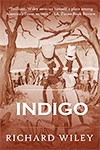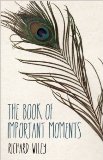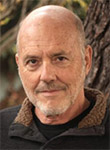Richard Wiley (Korea) | Who Told You She Is Your Wife?
Who Told You She Is Your Wife?
By Richard Wiley (Korea 1967–69)
•
Once a famous Nigerian playwright got a call from a woman who was
in love with him.
He knew the woman. She had been a paramour of his Or he of
hers. Or maybe their relationship had been on equal footing, I don’t
know. But whatever happened was years in the past by the time he
got the call. And in the call, the woman said she wanted him back.
“I am married now,” he told her. “Surely you know that.”
“Who told you you are married?” the woman asked, her voice settling
into the low center-of-gravity, pre-battle, mode that Nigerians know
how to articulate best.
“Who told me? I attended the ceremony. I remember exchanging
vows.”
“I will tear her asunder, teach her the meaning of ‘six feet under,’ then
we’ll see who’s married. Who told you she is your wife?”
More than a decade has passed since I heard that story, so I hardly
need to admit that I’m using a bit of writerly license in telling it to you
now, in pretending to quote while really only paraphrasing, in order to
get to the fabulous line, “Who told you she is your wife?” a line that
came verbatim, right from the horse’s mouth…
Er, the ‘horse’ in question being the playwright, not the woman who
called.
Why is the line fabulous? First, because it is so odd, and oddness is
manna to a fiction writer; second, because it very deeply fits the
place. If I ever write another ‘Nigeria’ novel, “Who told you she is
your wife?” will be its opening line, perhaps even its title.
I lived in Nigeria for three years back in the 1980s. Me, my wife, my
then-young children… And I published two novels set there, the first,
called Indigo, came out in the early 1990s,
 I said in an essay some weeks ago that Indigo is the novel of which I
I said in an essay some weeks ago that Indigo is the novel of which I
am least proud, and though I didn’t say why in that essay, it had do to
with the cultural and linguistic mistakes in the book, mistakes I did not
then recognize.
I lived in Nigeria, yes, but in a way I didn’t live there… Not like I lived
in Korea and Japan in earlier decades of my life. For in those
countries, no matter my level of expertise, I lived within the Korean
and Japanese languages and cultures, while in Nigeria I hardly
learned a word of Yoruba or Igbo or Hausa, and our home was inside
the gates of an American compound. I ventured out often, to be sure,
but venturing out is not living in a place. So Indigo is an outsider’s
view of the country.…
Here is how Indigo begins:
Before leaving his flat to walk down the stairs and across the athletic
field to his office in the school, Dr. Jerry Neal looked through the
peephole in his door. Though there was rarely anyone else on the
stairs at this hour, the action was habitual. He liked to take his
morning walk alone, without the obligation to chat. He also liked to
be the first one at school, to walk through the hazy air without the
sounds of other people’s voices buzzing in his ears. The
school’s chief custodian, a Nigerian man with his shirt off and his
trousers unbuttoned, was washing himself at the side of the
courtyard and called out brightly when the principal came into view.
“Good morning, sir!”
Okay, there’s nothing particularly wrong with that beginning, right? It
is visual and there is a certain sense of character. But it is ever and
forever outside looking in. Later in the novel, when I tried to make
certain other characters speak west-African pidgin, I royally screwed
it up, but its main fault is its foreign view of things… and that may be
a bit of the kind of ‘cultural appropriation’ that I have tried to avoid
during the entirety of my writing life.
 Suffice it to say, it took twenty years of brooding about Indigo before I
Suffice it to say, it took twenty years of brooding about Indigo before I
tried to correct things by publishing a second Nigerian novel, The
Book of Important Moments, in 2013.
That novel is about the rape of a young Nigerian woman and, more
deeply, about her rapist, an albino Nigerian man. My idea was to
have the man commit an unforgivable act at the onset, then I would
spend the rest of the novel trying to make my readers forgive him for
it. But my deeper idea, of course, was to represent the country by becoming the country… a thing I had not done in Indigo.
Good idea? Bad idea? My agent was so much of the latter opinion that we parted ways over it.
Anyway, here is that book’s opening:
What street this is I think I know…
Its name’s not on the signpost, though.
No one will see me stopping here
to watch this girl walk home from school.
My loyal driver must think it queer,
to stop between the creek and the road,
this darkest evening of the year.
Ah, he thinks, but that’s entirely false. There isn’t much difference in
the time of nightfall, one season to another, so close to the
equator. He wonders if the poet, Robert Frost, in his sleigh in his
American woods, waited for the daughter of the man who owned
them, just as he now waits for Ruth, whom he’s courted so carefully
these last eleven months. Since she reads poetry he does, too, in
the book she left in his car, but he doesn’t like it very much.
What happens next is the rape in the backseat of the car, with the
man’s horrified driver looking on. After that, and after the driver runs
off with his hair on fire, we follow these two characters, the rapist and
his victim, as they head off into their lives.
Both Indigo and The Book of Important Moments are complex novels,
worthy, I hope, of a deeper look than I have foisted upon you here.
But given only those openings to go on, which do you prefer? Which
would you continue reading if you could choose only one?
I know what the answer is for me… I wouldn’t choose either, but
would stick with “Who told you she is your wife?” not only because it
is so beautifully strange, but also because that book’s not yet been
written.
And when a book’s not written, the possibility of writing something
great is not yet dead.
•
Richard Wiley (Korea 1967-69) is the author of ten works of fiction. His first novel, Soldiers in Hiding, won the PEN/Faulkner Award in 1987. He has also won The Maria Thomas Award, and the Washington State Governor’s Award. His most recent novel is author, most recently, of The Grievers’ Group. He is an emeritus professor of English at UNLV and currently resides in Los Angeles.

No comments yet.
Add your comment